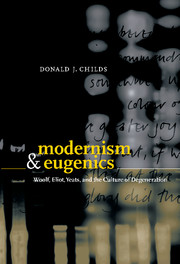Book contents
- Frontmatter
- Contents
- Introduction
- Chapter 1 Virginia Woolf's hereditary taint
- Chapter 2 Boers, whores, and Mongols in Mrs. Dalloway
- Chapter 3 Body and biology in A Room of One's Own
- Chapter 4 Eliot on biology and birthrates
- Chapter 5 To breed or not to breed: the Eliots' question
- Chapter 6 Fatal fertility in The Waste Land
- Chapter 7 The late eugenics of W.B. Yeats
- Chapter 8 Yeats and stirpiculture
- Chapter 9 Yeats and The Sexual Question
- Notes
- Index
Chapter 3 - Body and biology in A Room of One's Own
Published online by Cambridge University Press: 22 September 2009
- Frontmatter
- Contents
- Introduction
- Chapter 1 Virginia Woolf's hereditary taint
- Chapter 2 Boers, whores, and Mongols in Mrs. Dalloway
- Chapter 3 Body and biology in A Room of One's Own
- Chapter 4 Eliot on biology and birthrates
- Chapter 5 To breed or not to breed: the Eliots' question
- Chapter 6 Fatal fertility in The Waste Land
- Chapter 7 The late eugenics of W.B. Yeats
- Chapter 8 Yeats and stirpiculture
- Chapter 9 Yeats and The Sexual Question
- Notes
- Index
Summary
Perhaps the most interesting and productive outcome of Woolf's engagement with eugenics is the eugenical logic of inheritance that enables important aspects of her conception of the woman-centered literary tradition outlined in A Room of One's Own (1928). In figuring the origin and development of such a tradition, Woolf adopts a thoroughly biological model of inheritance. The model is broadly evolutionary – sometimes drawing on Darwin, sometimes drawing on Lamarck, particularly in depicting a woman writer's literary inheritance of her forbears' acquired characteristics. Furthermore, Woolf focuses literally upon the question of biological inheritance by examining the relationship between the woman writer and genius – the question of the heritability of genius enduring into Woolf's time as an issue bequeathed to eugenists by Galton's ground-breaking study, Hereditary Genius (1869). Finally, Woolf's essay concludes by enjoining women writers to engage in eugenically responsible literary breeding: the proliferation of the literary germ plasm depends on it.
- Type
- Chapter
- Information
- Modernism and EugenicsWoolf, Eliot, Yeats, and the Culture of Degeneration, pp. 58 - 74Publisher: Cambridge University PressPrint publication year: 2001

